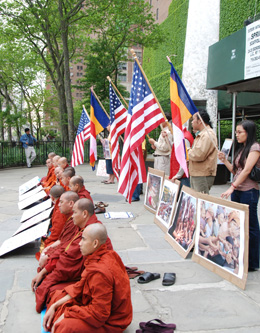Campaigning Monks
Though Elmurst is wracked by recession, the monks have no wants. As in Burma, they rely on the local community for food, and their monastery for shelter. Their people offer them new robes each year, in the traditional Kathina ceremony, as a sign of respect and appreciation for the monks’ work. Now such traditions can only be practiced outside Burma, the monks said sadly.
I was allowed to attend the Elmhurst Kathina ceremony this year.
“Spicy or ordinary?” asked Kyaw Ray Zhan, a Burmese student on hand for the ceremony. He handed me a dish of noodles, with sliced white fish, fried beans and purple onions and greens, and bowl of fish soup. For dessert, Ray served five assortments of gel-like desserts that jiggled when they moved. That made him laugh.
Ray, 30, came from the same region as U Kovida, rural Rakhine. His choppy black hair and long black eyelashes stuck straight out. His teeth bent in, and broke through his wide smile. Before he and others marched all day and night in other anti-junta student demonstrations of 1996, he’d been studying technology. But in 1996, the schools were shut down. The police kicked and dragged him, and beat him on the thighs. With others he was piled into the cars headed for a military camp, and interrogation. “You couldn’t turn your head,” he said. “People died in those cars.”
He arrived in Elmhurst in 1999. Now works on the monks’ website, and studies computer science at the City University of New York. “I wanted to leave because I would have most likely gone to jail,” he said. “Or died.”
With no sign of loosening of the repression at home, the Burmese refugee community in Emhurst keeps growing. Forty new émigrés recently arrived.
Mornings, Burmese expatriates bring the monks food, and either water or traditional Thai iced tea, a green sugary juice with a hint of lemon taste. Because the United States is rich in opportunity, the monks said, the Burmese expatriates can work and make donations.
They spend most of the morning meditating, and offering spiritual guidance to their donors. They teach Buddhist lessons, and pray and chant to the Buddha five to seven times a day.
After noon, they don’t eat solid food. They devote their minds and bodies to the Buddha; sit with visitors, and work to raise awareness about the tragedy of Burma.
Many also spend time researching, studying, and reading. In Burma, there are American libraries available to those who can pay for $15 membership fee. “Most cannot,” Ray said.
Before leaving for California, U Kovida, took ESL classes, and spent much of his free time at the Elmhurst public library, reading books, such as “Gandhi, Che Guevara, many biographies,” Ray said.
One Friday, walking home from English class, Kovida stopped to talk to a homeless man.
“[He] was sitting on the ground, looking as if he was paying homage. He was a drinker,” Kovida said. “I really, really, have peace for him, so I speak a little bit to him. I know that many people are looking at me. But we all need the peace, the kindness, the love, even if he is drinking, drug, homeless.” A new understanding of the universal need for compassion flooded over him. “I realized [this] because of him.”
The monks are dogged political activists. While car radios blast at stoplights and yellow cab drivers honk and streetwalkers snarl as they pass the brick office, they campaign for U.S. and international backing for their cause, via peaceful demonstrations and words of loving-kindness.
“Our enemy is our country,” said U Nayaka. “And if American people help us…”
“If international people help us,” interrupted U Pannya Vamsa, shooing away the statement as if it had been buzzing in his ears for years. The monks want the U.N. Security Council to support an arms embargo against Burma, but need to convince China, India and Russia to back that initiative. The European Union and the United States have already called on the Security Council to do so, and have also urged the Burmese government to release all political prisoners (a leading opposition group puts the number of political prisoners at 2,100). Each letter the monks write closes with the phrase: “In Peaceful Happiness.”
As they put it in a December 2008 letter to U.N. Secretary-General Ban Ki Moon: Ours is a “simple quest for human rights, democracy, and a decent life not lived in constant fear and deprivation.”
Today, the monks place their hope in President Barack Obama. As they said in their November congratulatory letter to the then president-elect, “We hope that your message of change will ripple out to our country.” They’re waiting to see.

